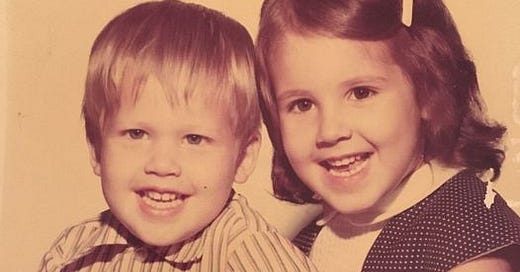Who are the instigators of change?
Earlier this week, someone described me using these words, which got me thinking.
I’m sitting in a wooden pew at St. Paul’s Catholic Church, 45 or so years ago. Slumped with crossed arms, feet on the kneelers, I struggled to pay attention to the homily. I also tried to ignore the gestures and whispered jokes coming from my brother, Steve.
Head down, lips pursed, I shook as I tried to suppress the laughter. Side-eye glances from our mother only made everything seem funnier. Only 14 months younger than me, I was the quieter, rule-following, older sister, who was more comfortable giggling in the background, supporting his comedic antics. No one was suprised when this instigator was voted “Most Humorous” in his senior high school class.
My place on the periphery continued through adulthood. When my husband decided with my blessing to run for his first political office in 1999, I was chief supporter and confidant. He was the one that would create change through civic service, while I longed to live a quieter life where no one stopped me in the grocery or car line to ask his position on a particular issue.
Throughout our 22 years of public life, I’d been given a few monikers. Stepford Wife, Eye Candy, and Secret Weapon were a few, but 5 days ago, I gained another. Almost two years out of the public eye, someone referred to me as an “Instigator of Change.”
For most of the 22 years that my husband was elected to something, I resisted public life. Within an hour of winning his first mayoral race, I received texts from friends and acquaintances congratulating me, the new “First Lady.” That wasn’t me, I scoffed.
Political life made me a pro at pivoting, whether it was a disrupted schedule, or willing myself to endure one more political campaign (there were 8). Perpetual motion doesn’t provide many opportunitites to take stock. I rarely reflected on what I brought to my half of the political couple. Toward the end of his political career, people began asking what it took to thrive in the public spotlight. Most of the time, no one asked about the role of a political spouse. Now, people were interested in my experiences. I learned through writing Accidental First Lady that sharing our stories can create change. Some even called me resilient, a halo I hesitate to accept, for I’ve always felt lucky, compared to others’ whose lives were difficult from the beginning, and for whom hope was elusive.
The fluidity of life means that we will all endure circumstances - good and bad - that can lead to resilience. How we navigate difficulties can be a roadmap for others as they move through their own challenges.
No one is immune from crisis. Despite losing our home and beloved Labradors to a fire, struggling with infertility, and suriving ovarian and uterine cancer, I recognized that no matter how dire a situation, there is always room for grace. A decade between each of these life-altering events was a gift.
When I was diagnosed with cancer in 2019, I’d planned to tell only friends and family. That changed, just 6 weeks after life-saving surgery and 2 days after my first chemotherapy treatment. After Rick accompanied me to my 1st treatment, a curious reporter pressed his staff for an answer to why he was out of the office for “family business” on a Thursday.”
To dissuade anyone from creating their own narrative, he strongly encouraged me to announce my diagnosis to the public. I was still getting used to the label, “cancer patient,” as I geared up for the marathon where I’d finish as “cancer survivor.”
Time to pivot again.
Conceding to share my diagnosis, I was that Instigator of Change. I reframed my approach. I crafted a statement that would assure anyone who was concerned that the city was in good hands, even if they mayor’s wife had cancer.
There’s more to my cancer coming out story than the announcement. The community that was created after I went public was almost as suprising as the declaration from the doctor who told me, “You have a 20-cm tumor on your right ovary.”
Many people endure crises on their own. I was surrounded by supportive family and friends. My recovery was easier because I didn’t have to worry about whether my health insurance would pay for treatment. I had surgery and chemotherapy less than 15 minutes from home. My boss allowed me to work my part-time from home. Our community prayed for me, checked in on me, offered meals, and sent cards.
Many who shared their cancer journeys with me told me my words prompted them to pursue answers to unresolved symptoms.
According to “America’s Most Trusted Dictionary,” Merriam-Webster, to instigate is to provoke, goad, or urge forward. I know my brother’s silliness in church when we were kids fit this definition, but still I wondered what it meant for me.
I Googled, “instigator of change,” and the first name attached to this moniker was Dr. Marting Luther King, Jr. Again, I laughed, just as I did when people called me “First Lady." How could I be included in the same category as someone who spent his life fighting, then dying, for civil rights?
A lifelong habit of standing beside instead of standing in front produced a muscle memory that solidified a belief that sharing my experiences didn’t matter. Five days after being called an Instigator of Change, I’m beginning to accept that I have the capacity to bring forth change. This isn’t a super power reserved for a few, like Dr. King and other famous people. We all possess the ability to pivot when necessary, provoke thought, and be an instigator of change.
I will continue to share my experiences, when applicable, to affect change. I look forward to continuing to connect with and learn from others who courageously do the same. Different yet similar, we are all Instigators of Change.
NOTE: September is Ovarian Cancer Awareness Month. Find resources at Ovarian Cancer Research Alliance and Celma Mastry Ovarian Cancer Foundation.






Nothing. is. accidental. You are an amazing shining star. Thank you.